
Abraham is the common Hebrew patriarch of the Abrahamic religions, including Judaism, Christianity, and Islam. In Judaism, he is the founding father of the special relationship between the Jews and God; in Christianity, he is the spiritual progenitor of all believers, whether Jewish or non-Jewish; and in Islam, he is a link in the chain of Islamic prophets that begins with Adam and culminates in Muhammad. As the namesake of the Abrahamic religions, Abraham is also revered in other Abrahamic religions, such as Druze Faith and Baháʼí Faith.

Isaac is one of the three patriarchs of the Israelites and an important figure in the Abrahamic religions, including Judaism, Christianity, and Islam. Isaac first appears in the Torah, in which he is the son of Abraham and Sarah, the father of Jacob and Esau, and the grandfather of the twelve tribes of Israel.

Sarah is a biblical matriarch, prophet, and major figure in Abrahamic religions. While different Abrahamic faiths portray her differently, Judaism, Christianity, and Islam all depict her character similarly, as that of a pious woman, renowned for her hospitality and beauty, the wife and half-sister of Abraham, and the mother of Isaac. Sarah has her feast day on 1 September in the Catholic Church, 19 August in the Coptic Orthodox Church, 20 January in the LCMS, and 12 and 20 December in the Eastern Orthodox Church.
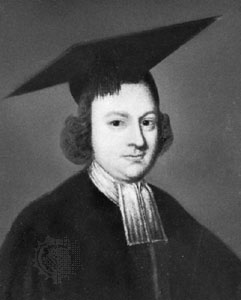
Christopher Smart was an English poet. He was a major contributor to two popular magazines, The Midwife and The Student, and a friend to influential cultural icons like Samuel Johnson and Henry Fielding. Smart, a high church Anglican, was widely known throughout London.
Isaac Bickerstaffe or Bickerstaff was an Irish playwright and librettist.

John Christopher Smith was an English composer who, following in his father's footsteps, became George Frideric Handel's secretary, student and amanuensis.

Jubilate Agno is a religious poem by Christopher Smart, and was written between 1759 and 1763, during Smart's confinement for insanity in St. Luke's Hospital, Bethnal Green, London. The poem was first published in 1939 under the title Rejoice in the Lamb: A Song from Bedlam, and edited by W. F. Stead from Smart's manuscript, which Stead had discovered in a private library.

Hymns and Spiritual Songs for the Fasts and Festivals of the Church of England, by Christopher Smart, was published in 1765, along with a translation of the Psalms of David and a new version of A Song to David. He wrote these poems while he was in a mental asylum and during the time he wrote Jubilate Agno.

Hymns for the Amusement of Children (1771) was the final work completed by English poet Christopher Smart. It was completed while Smart was imprisoned for outstanding debt at the King's Bench Prison, and the work is his final exploration of religion. Although Smart spent a large portion of his life in and out of debt, he was unable to survive his time in the prison and died soon after completing the Hymns.
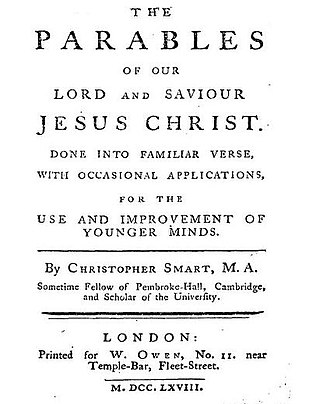
The Parables of Our Lord and Saviour Jesus Christ Done into Familiar Verse, with Occasional Applications, for the Use and Improvement of Younger Minds was written by Christopher Smart and published in 1768. The Parables are a collection of parables from the Bible, which includes lessons from both the Old Testament and the New Testament. The book depicts the parables in verse form.
A Song to David, a 1763 poem by Christopher Smart, was, debatably, most likely written during his stay in a mental asylum while he wrote Jubilate Agno. Although it received mixed reviews, it was his most famous work until the discovery of Jubilate Agno.
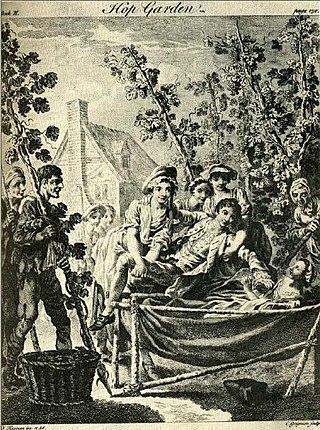
The Hop-Garden by Christopher Smart was first published in Poems on Several Occasions, 1752. The poem is rooted the Virgilian georgic and Augustan literature; it is one of the first long poems published by Smart. The poem is literally about a hop garden, and, in the Virgilian tradition, attempts to instruct the audience in how to farm hops properly.

In 1752, Henry Fielding started a "paper war", a long-term dispute with constant publication of pamphlets attacking other writers, between the various authors on London's Grub Street. Although it began as a dispute between Fielding and John Hill, other authors, such as Christopher Smart, Bonnell Thornton, William Kenrick, Arthur Murphy and Tobias Smollett, were soon dedicating their works to aid various sides of the conflict.

The Hilliad was Christopher Smart's mock epic poem written as a literary attack upon John Hill on 1 February 1753. The title is a play on Alexander Pope's The Dunciad with a substitution of Hill's name, which represents Smart's debt to Pope for the form and style of The Hilliad as well as a punning reference to the Iliad. In "Book the First" of The Hilliad, Hillario is seduced by a Sibyl to give up his career as an apothecary and instead becomes a writer. However, his fortune quickly descends with Hillario ultimately turning into the "arch-dunce".
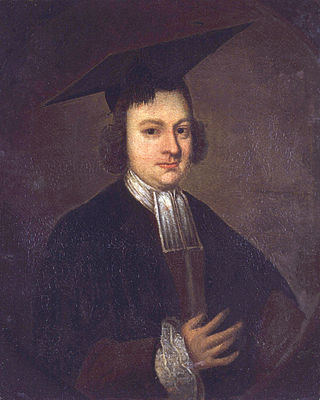
The English poet Christopher Smart (1722–1771) was confined to mental asylums from May 1757 until January 1763. Smart was admitted to St Luke's Hospital for Lunatics, Upper Moorfields, London, on 6 May 1757. He was taken there by his father-in-law, John Newbery, although he may have been confined in a private madhouse before then. While in St Luke's he wrote Jubilate Agno and A Song to David, the poems considered to be his greatest works. Although many of his contemporaries agreed that Smart was "mad", accounts of his condition and its ramifications varied, and some felt that he had been committed unfairly.

Hannah is an oratorio in three acts by Christopher Smart with a score composed by John Worgan. It was first performed in Haymarket theater 3 April 1764. It was supposed to have a second performance, but that performance was postponed and eventually cancelled over a lack of singers. A libretto was published for its run and a libretto with full score was published later that year.
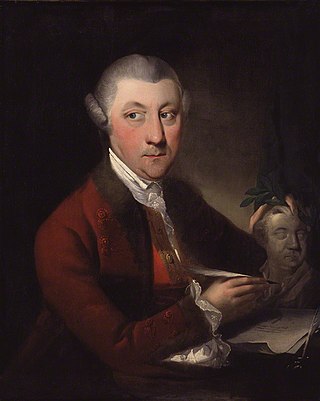
Thomas Hull (1728–1808) was an English actor and dramatist.
Anthony Shaw was born in 1747, probably in Bath, and died aged 45 on 26 August 1792 in Margate. He was a violinist and was the band leader at the Covent Garden Theatre until his death. Anthony Shaw was the son of Bathonian musician Thomas Shaw (1715-92) and was the older brother of the composer Thomas Shaw.

His Only Son is a 2023 American biblical drama film produced, edited, written and directed by David Helling. Primarily set in Canaan, the film centers on the account from Genesis 22 in the Old Testament when the Lord tells Abraham to sacrifice his only son, Isaac, on Mount Moriah. The film stars Nicolas Mouawad as Abraham, Sara Seyed as Sarah, Edaan Moskowitz as Isaac, and Daniel da Silva as the Lord, alongside Ottavio Taddei and Nicolai Perez. It was released in the United States on March 31, 2023.
















